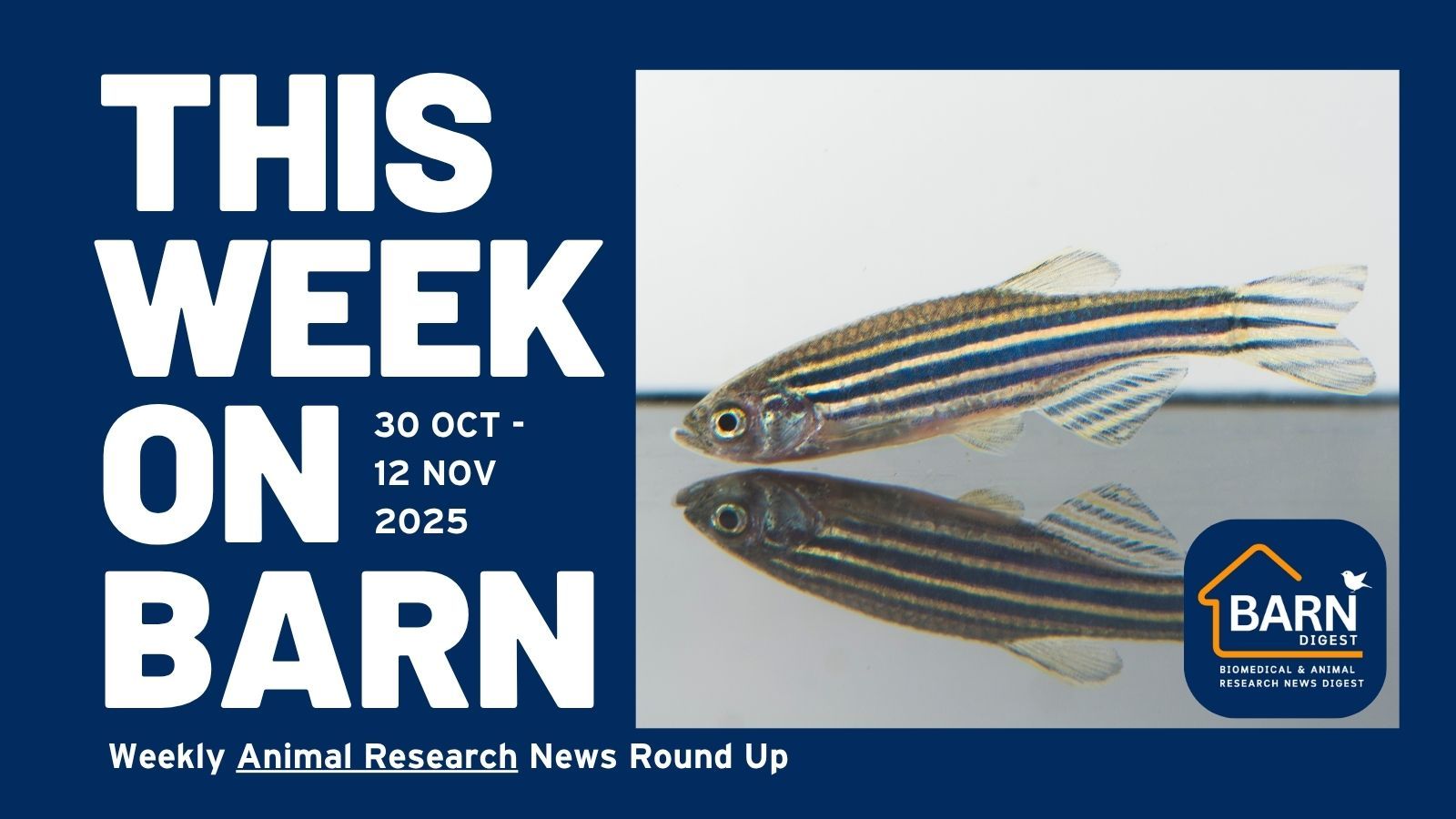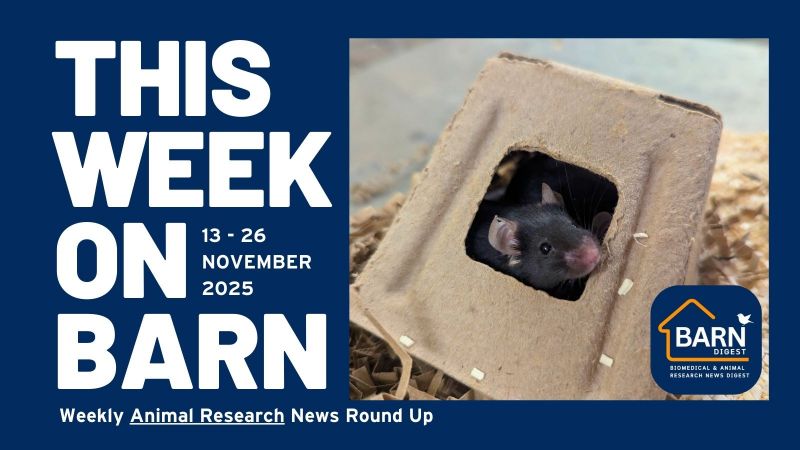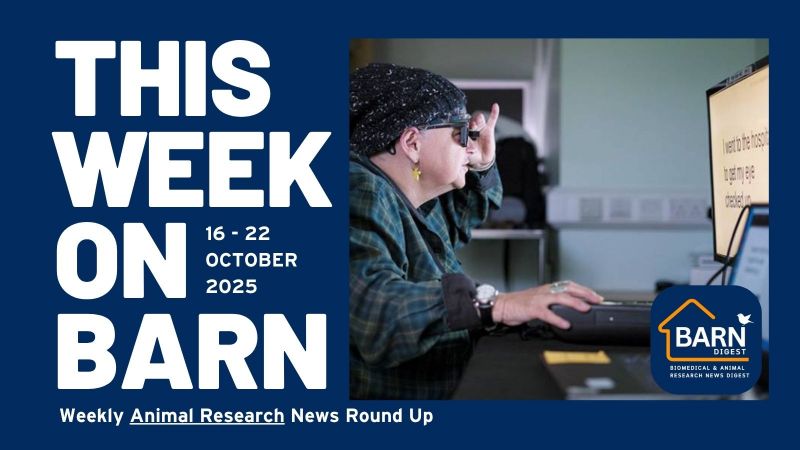
The Biomedical Animal Research News (BARN) Digest collates animal research news from UAR’s 150+ member organisations into one, easy to access, feed. These animal research related stories include topics such as: medical studies and advancements; animal welfare and 3Rs news; funding, regulatory, and policy news; and conservation and environmental research that involves animal testing.
Each week, we pick the most interesting, groundbreaking, and important news to feature in a weekly news roundup. We were unable to publish a round up last week, so this week we are featuring news stories from 30 October - 12 November 2025.
View BARN to see daily news updates from UAR members.
BASIC/DISCOVERY RESEARCH
Why older mice have smaller offspring—and how sex may play a role
UNIVERSITY OF MANCHESTER | MICE
"A study by University of Manchester scientists has revealed some of the mechanisms which may explain why older mice are more likely to give birth to offspring that have not grown to their full potential in the womb. The study in older animals showed that the placentas of male but not female offspring had increased cell damage from a biological state called oxidative stress.
Oxidative stress occurs when harmful molecules called free radicals build up faster than the body can clear them. It is associated with a range of pregnancy complications including fetal growth restriction and preeclampsia, both of which increase the risk of stillbirth. The study demonstrated reduced weight in both female and male fetuses in older mice, but the placental alterations were sex-specific.
The scientists are conducting further studies in mice to confirm these findings and also carrying out a parallel study to see if similar sex differentiated mechanisms exist in human placentas from mothers of advanced maternal age (AMA), defined as age 35 and over. "
The Eyes Have It - New Groundbreaking Research Reveals the Evolution of Seeing in Colour
UNIVERSITY OF SUSSEX | ZEBRAFISH
"A new study from the University of Sussex out today reveals that fish see the underwater world in a completely different way to humans and the discovery could change how we understand the evolution of human vision.
Using advanced brain imaging researchers found that zebrafish eyes are tuned not to the colours of the rainbow, but to “whiteness”, helping them detect nearby objects in murky water. This ancient visual strategy, scientists say, may have laid the foundations for how human colour vision later evolved.
This discovery sheds light on how the first visual systems evolved hundreds of millions of years ago and suggests that colour vision originally developed as a way to “see distance”, not colour itself."
https://www.sussex.ac.uk/broadcast/read/69414
DRUG DEVELOPMENT/NEW MEDICINES
Scientists develop a drug to stop cancers resisting chemotherapy
CANCER RESEARCH UK | MICE
"Now, the first lab study of the drug has shown that it boosts the effectiveness of chemotherapy in mouse models, making chemotherapy-resistant tumours vulnerable.
“We discovered that macrophages guard the tumour and can block effects of chemotherapy,” says Professor James Arnold, head of the Tumour Immunology Group at KCL and one of the co-leads of the research. “They’re acting as gatekeepers stopping cancer-fighting immune cells from coming in and supporting the treatment, but, by targeting the right pathway, we can open the door.”
New drug candidate offers hope to slow down MND progress
UNIVERSITY OF SHEFFIELD | MICE
"A groundbreaking drug candidate found to protect nerve cells damaged by motor neuron disease (MND), could offer new hope to people living with this devastating condition.
- Preclinical results show a new neuroprotective medicine which 'switches on' cell defenses, could significantly slow disease progression
- Researchers at the University of Sheffield’s Institute for Translational Neuroscience (SITraN) discovered M102 has powerful protective effects on the nerve cells that are damaged in MND
- In studies of MND mouse models, M102 improved movement, gait and motor neuron health and in cell models derived from MND patients motor neuron protection was also achieved
- The research predicted safe and effective dose ranges for humans, paving the way for clinical trials"
https://sheffield.ac.uk/news/new-drug-candidate-offers-hope-slow-down-mnd-progress
New research uncovers promising target for autoimmune disease treatment
SWANSEA UNIVERSITY | MICE
"A new study led by Swansea University has revealed a new way to potentially treat certain autoimmune diseases by targeting a protein that helps regulate energy production in immune cells.
The new research, published in Nature Communications, has revealed that a protein called ABHD11, found in the mitochondria (the cell’s engines that power an immune response), plays a key role in regulating T-cell overactivity. Researchers, studying immune cells from the blood of individuals living with and without type 1 diabetes or rheumatoid arthritis, have found that using a drug to stop the ABHD11 protein from working reduces inflammation by minimising T-cell over-activity, limiting their production of inflammatory signals.
The research also observed that blocking ABHD11 with the drug delayed the development of type 1 diabetes, offering hope for future therapies aimed at controlling autoimmune conditions. The research was co-led by Dr Nick Jones from Swansea University, Professor Emma Vincent, at the University of Bristol and Dr James Pearson from Cardiff University."
https://www.nature.com/articles/s41467-025-65417-4
University spinout highlights outstanding performance of vaccine candidate
UNIVERSITY OF PLYMOUTH | COWS
"The Vaccine Group (TVG), a University of Plymouth spinout company, has demonstrated outstanding results in a trial of its novel vaccine candidate for bovine respiratory syncytial virus (BRSV).
BRSV is highly contagious cause of bovine respiratory disease, with estimates from the Pirbright Institute suggesting that it could present an annual cost to British farmers of £54 million, while the global figure could be as much as £5.6 billion.
In a trial conducted by the UK Government’s Animal and Plant Health Agency, three to six-week-old calves were immunised intramuscularly with TVG’s bovine herpesvirus-4 vaccine platform technology."
ANIMAL RESEARCH BEST PRACTICE
Advocating for automation in animal research
MARY LYONS CENTRE AT MRC HARWELL | LABORATORY ANIMALS
"In a new article in Disease Models & Mechanisms, the COST Action TEATIME welfare group, which includes the Mary Lyon Centre’s Hilary Gates, Sonia Bains, and Sara Wells, makes the argument for increased use of automated welfare and phenotypic analysis in animal research, while discussing the significant challenges that need to be overcome to realise the potential benefits of artificial intelligence (AI) and machine learning (ML) technologies and automation in animal research."
https://www.har.mrc.ac.uk/news/advocating-for-automation-in-animal-research/
REPLACING, REDUCING, REFINING ANIMALS IN RESEARCH
The Centre for Predictive in vitro Models provide expert comment on new Government strategy
UKRI | IN VITRO MODELS/NON-ANIMAL METHODS
"Academics at the Centre for Predictive in vitro Models at Queen Mary University of London, have provided expert comment to the BBC about the new alternatives strategy launched today (11 November) by the Department for Science, Innovation and Technology.
Watch Queen Mary experts speak to the BBC about the Government's new alternatives strategy on 11 November from 6.10am.
This new strategy outlines the Government's vision of eliminating the use of animals in research and development in all but exceptional circumstances, and sets out a plan to achieve this by replacing animals with alternative methods wherever possible."
See UAR's comment on the new Government strategy: https://www.linkedin.com/feed/update/urn:li:activity:7394003384384716800
Ambitious new UK project to transform human disease modelling
UNIVERSITY OF LEICESTER | IN VITRO MODELS/NON-ANIMAL METHODS
"A major new initiative involving Leicester experts aims to redefine human-based research models for greater understanding of disease and the acceleration of new medicines.
The joint £15.9 million investment by the UKRI Medical Research Council (MRC), Wellcome and UKRI Innovate UK will enable the development of advanced, specific and highly reproducible human in vitro models with the aim of making them widely available to researchers in academia and industry.
In vitro models use isolated cells and tissues outside the living body and can come in many forms, including stem-cell derived cell and tissue aggregates that display some organ features on a smaller scale (organoids), tissue slices removed during surgery (ex vivo/explant tissue cultures); and organ-on-chips, which combine cell culture with microfluidics to mimic the structure and function of different organ tissues.
In vitro models will also provide new alternatives, helping to reduce the reliance on animal models in research and drug development."
https://le.ac.uk/news/2025/november/cancer-therapies-leicester-research-models
Bioengineered bone marrow model successful in leukaemia research
UKRI | IN VITRO MODELS/NON-ANIMAL METHODS
"University of Glasgow scientists have used the first bioengineered bone marrow model to advance cancer research and reveal new therapy insights.
Published in the journal Biomaterials, this represents an important step forward in being able to carry out medical research without the use of animals.
This crucial research was funded by the Biotechnology and Biological Sciences Research Council (BBSRC) and the Engineering and Physical Sciences Research Council."
https://www.ukri.org/news/bioengineered-bone-marrow-model-successful-in-leukaemia-research/
Home-cage monitoring to refine and reduce animal use in drug safety testing
NC3RS, CHARLES RIVER | HOME CAGE MONITORING
"Non-invasive, continuous monitoring of rodent behaviour improves both animal welfare and scientific accuracy in safety pharmacology.
A home-cage analyser system (HCA) developed by Actual Analytics and funded through the NC3Rs CRACK IT programme* has been validated for use in safety pharmacology studies focused on central nervous system (CNS) endpoints. The HCA monitors animals in their home-cages using infrared video and RFID telemetry, recording and analysing their activity continuously without human intervention.
The study, which was conducted by Charles River in partnership with researchers from Actual Analytics and the University of Edinburgh and used compounds provided by AstraZeneca, GSK and Janssen, demonstrated that the HCA was able to identify subtle behavioural changes in rats indicative of potential CNS side effects. Importantly these effects, such as such as hypoactivity in the dark phase, were missed in traditional studies. By being able to identify compounds with safety liabilities earlier in the process the HCA helps to reduce the use of animals in drug development."
https://nc3rs.org.uk/news/home-cage-monitoring-refine-and-reduce-animal-use-drug-safety-testing
Visit BARN for daily news updates
Last edited: 12 November 2025 10:37




